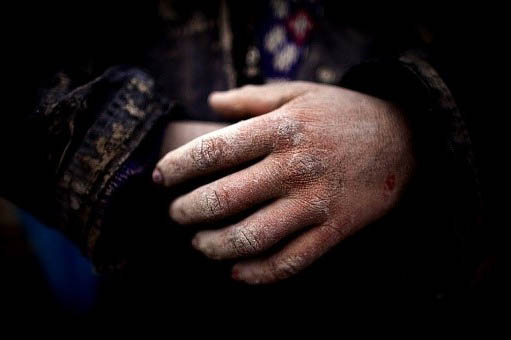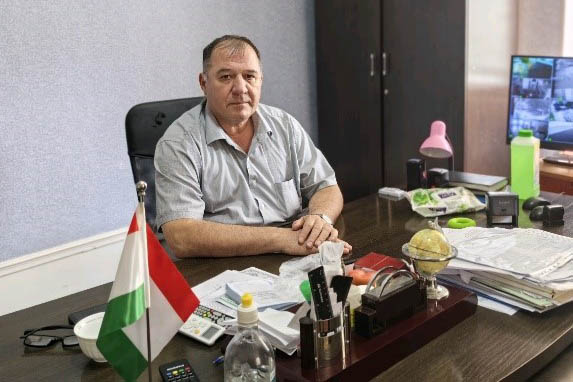Psychological rehabilitation of returned migrants: Overcoming stereotypes and access to psychosocial assistance in Tajikistan
Read also

DUSHANBE, 09.10.2023 (NIAT Khovar) – Every year, a large number of people from Tajikistan go abroad in search of work. Most of them are men, short-term seasonal migrants (75%). Tajik migrants are mainly rural residents (85%) aged 15 to 44 years old.[1]
Migrants tend to leave Tajikistan for the Russian Federation – due to the absence of a visa regime between the countries, historical ties, the presence of Tajik communities and migrant networks, higher salaries, and the demand for labor. While working in Russia, not all migrants draw up the necessary documents to legalize their status. Without documents, our citizens become vulnerable: relations with the employer become informal, a migrant works more than 8 hours a day, usually in difficult working and living conditions. According to a study by the International Organization for Migration, many returned migrants have high level of stress.[2]
“This year, I celebrated my birthday with my family for the first time in 18 years. Instead of joy, I wanted to cry. I felt as if it was alien to me and I had to re-learn to speak, to contact people, to accept congratulations, to feel the love and care of my loved ones – because I had been deprived of all this for a long time. During my labor migration, I was often isolated from communication, working as a cleaner for 12 hours a day. I had to sleep in different places, sometimes the rooms were dim and damp; sometimes, I turned off the lights to save a penny and send money to my son in the homeland. All this affected my health, my attitude towards people. My blood pressure was high, I felt very bad. Then I had insomnia, although I wanted to sleep very much, but at night, my arms and legs went numb, and I started to have severe pains and spasms. Today I am at home and I already know that if I feel bad, my family will come to my aid.” — says Firuza M.
The story of Firuza, a resident of a rural area in Tajikistan, shows that migration itself is already an acute stressful situation for the human body. Psycho-emotional state depends on what problems a migrant faces and how he or she manages to solve them. For one migrant, a problem may seem insignificant, while for another person it may become the cause of permanent, pathological stress (so-called distress).
To better understand the relationship between migration and migrant health, the IOM office in Tajikistan in collaboration with the Ministry of Health and Social Protection of the Republic of Tajikistan and the Ministry of Labor, Migration and Employment of the Republic of Tajikistan, with support from the IOM Development Fund (IDF) conducted qualitative research in 2022 and prepared a report on “Mental health problems of returned Tajik labour migrants and their experiences seeking mental health care and psychosocial support”
The research methodology consisted of analysis of the legal framework, review of existing publications, interviews with experts, focus group discussions and 50 in-depth interviews with returning labor migrants in 10 regions of Tajikistan (Dushanbe, Khujand, Kanibadam, Penjikent, Rudaki, Vakhdat, Gissar, Bokhtar, Pyanj and Kulyab).
More than half of the respondents indicated that they often consulted various doctors due to somatic symptoms (headache, fatigue, lack of energy, unreasonable pains in the whole body, muscles, abdomen, sleep disorders, hypertension, appetite problems); affective symptoms (nervousness, irritability, aggressiveness, loss of control, lack of interest or pleasure, depression, bad mood, suicidal thoughts). Cognitive manifestations (problems with memory and concentration); behavioral signs (unwillingness to socialize with others, withdrawal); and other ailments are also observed. Typically, clinicians do not suspect that all of these problems may be symptoms of long-term stress and depression. Due to the lack of approved clinical protocols for diagnosis and treatment, these symptoms are often treated by family physicians as manifestations of other illnesses. Therefore, patients receive prolonged and ineffective treatment, which sometimes leads to a worsening of the patient’s general condition.
Speaking about access to health care services, it is important to note the problem of shortage of medical personnel, especially among family physicians, psychiatrists-narcologysts and rehabilitation experts. “To date, there is an acute shortage of personnel in the national psychiatry. There are 74 people working, of whom 23 are of retirement age, including me. I am a pensioner; and there is a shortage of 182 more qualified psychiatrists”, says Khurshed Kungurotov, Chief psychiatrist at the Ministry of Health and Social Protection of the Republic of Tajikistan.
Although the number of doctors has increased over the last ten years, the number of medical personnel remains insufficient: 21.2 doctors and 58.6 middle medical personnel per 10 thousand inhabitants.[3] While in Dushanbe, there are 83.2 doctors per 10 thousand inhabitants, in Khatlon province there are only 11.6 doctors for the same number of citizens.
In order to ensure access to psychosocial services, especially in remote regions of the country, the Health Code of the Republic of Tajikistan established the right of primary health care (PHC) physicians (who have received special training) to diagnose common mental disorders and treat depression. However, in reality, PHC specialists often lack sufficient training and skills to diagnose and treat mental disorders.
The issue of stigma and discrimination
Khurshed Kungurotov, Chief psychiatrist at the Ministry of Health and Social Protection of the Republic of Tajikistan, considers the problem of stigmatization and discrimination of human psycho-emotional health as a serious barrier to access to health services. Returned migrants often keep silent about their psycho-emotional problems; they do not consult psychiatrists and psychologists in time, preferring to self-medicate or resort to the services of witch doctors, sorcerers, psychics, fortune-tellers and other businessmen who are ready to profit from human grief.

“For more than 40 years I have been working as a psychiatrist, and every time I face the same stigma that has been put on all psychiatric health centers – “madhouse”. This is complete discrimination and disrespect to people who need mental help. And no one is immune to this”, — says Khurshed Kunguratov. — “Moreover, this word scares not only migrants, but also all people who want to turn to us for help, because they think that later this word will be attached to it. You know how important it is to provide timely mental health care to people in need. In my practice, among returned labor migrants in a depressed state, some had obsessive suicidal tendencies. Other people can have prolonged stress and, if left untreated, it manifests itself in different ways. In the end, not only the person suffers, but also the people around him or her”.
Dr. Kungurotov noted that men coming from labor migration bring home the practice of drinking alcohol, which causes various forms of “risky” behavior (aggression, scandalousness, etc.). This, in turn, can cause domestic violence against household members, especially wives and children. In this regard, the issues of access to psychosocial services, as well as medical care for returned migrants and their family members become particularly relevant.
Public health strategy to improve the mental health
The Government of the Republic of Tajikistan has developed and implemented national programs on a number of infectious and non-communicable diseases, including HIV, tuberculosis, diabetes mellitus, etc. In addition, a national Strategy for the protection of public health for the period up to 2030 has been adopted (Annex 1, September 30, 2021, Decree No. 414). One of the priority tasks is “the development and implementation of clinical practice guidelines for early diagnosis and treatment of somatic, reproductive, infectious, neuropsychiatric, and mental disorders”.
The Health Strategy Implementation Plan[4] includes activities aimed at reducing the prevalence of psychosocial stress, as well as the analysis, training, adoption and implementation of integrated clinical protocols recommended by the World Health Organization (WHO) for the prevention and control of mental illness at the primary care level.
In addition, it is planned to expand cooperation with migrant-receiving countries through coordination and action on cross-border health issues, especially on issues affecting the improvement of access to preventive and health services for migrants from Tajikistan.[5]
According to Natalia Zotova, an IOM international expert, Tajikistan could make a major breakthrough by developing a National Mental Health Program in cooperation with the World Health Organization and other partners. Such a practice has not yet been implemented in Central Asian countries.

“Interrelated problems and tasks can be solved step by step, including the integration and adoption of international protocols and generally accepted standards, improving communication and awareness among primary health care physicians, and introducing new specialties in medical schools, such as clinical psychologist or psychotherapist, which are very popular in some countries, but in Tajikistan there is no such specialty yet. Mental health affects many aspects of life – for the migrant, his family and society as a whole. Even simple depression in complicated forms can lead to disability. It has been well said that stress kills, and this is not a joke. It is important to conduct information campaigns at all levels, to conduct a multi-sectorial dialogue, which will bring the problem to the surface and minimize stigma regarding mental health care”.
Shoira Toirova,
journalist
[1] According to the Asian Development Bank’s 2020 report “Strengthening support for labor migration in Tajikistan: Assessment and recommendations”.
[2] International Organization for Migration (IOM), 2023. Mental health problems of returned labor migrants from Tajikistan and their experience of seeking medical care and psychosocial support. IOM, Geneva.
[3] Strategy of Health Protection in the Republic of Tajikistan for the period up to 2030 (Annex 1, September 30, 2021, No. 414. — P.14. Electronic resource: http://www.adlia.tj/show_doc.fwx?Rgn=140295
[4] Action Plan for the implementation of the Strategy of Health Protection of the Republic of Tajikistan for the period up to 2030 for 2021-2023 years (Annex 2, September 30, 2021, #414) — P.11. Electronic resource: http://www.adlia.tj/show_doc.fwx?Rgn=140295
[5] Strategy of Health Protection of the Population of the Republic of Tajikistan for the period up to 2030 (Annex 1, September 30, 2021, No. 414. – Page 46. Electronic resource: http://www.adlia.tj/show_doc.fwx?Rgn=140295
























